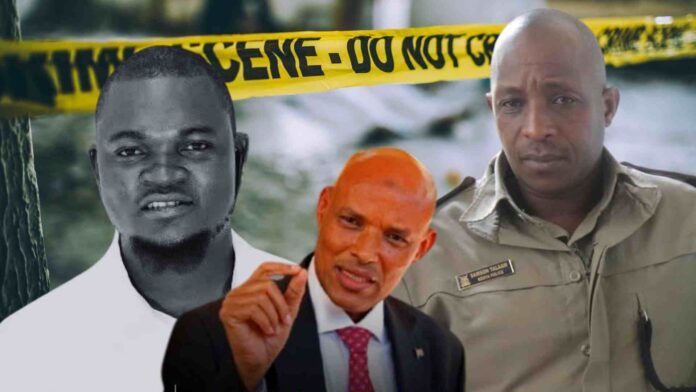Police Constable Mukwana confessed to being ordered by superiors to “discipline” Ojwang.
Orders allegedly came from DIG Eliud Lagat and OCS Samsom Talaam.
Ojwang arrived at Central Police Station on June 7 and was brutally tortured by four officers.
Ksh2,000 bribes were allegedly paid to officers involved in the torture.
DIG Lagat stepped aside as revelations rocked the police hierarchy.
How DIG Lagat’s Orders Led to the Death of Blogger Albert Ojwang
A Quick Recap of This Story
The Orders That Set a Deadly Plan in Motion
The events leading to the death of blogger Albert Ojwang on the night of June 7, 2025, paint a harrowing picture of institutional rot and command-driven brutality within Kenya's police service. Police Constable James Mukwana, now a central figure in the ongoing investigation, gave a damning testimony revealing that he was summoned by his immediate superior, OCS Samsom Talaam, who conveyed a directive allegedly issued by Deputy Inspector General Eliud Lagat.
The order was explicit: a suspect would arrive at the Central Police Station around 8:00 p.m., and once identified, he was to be “dealt with” — a chilling euphemism that needed no further explanation in the command hierarchy. Despite reservations, Mukwana was reassured that, as a junior officer, he bore no personal risk if he simply obeyed. This reassurance would later prove tragically false.
The Arrival, the Identification, and the Torture
At approximately 9:00 p.m., a black Subaru arrived at Nairobi Central Police Station, carrying Albert Ojwang in handcuffs. According to Mukwana’s account, confirmation of Ojwang’s identity came directly from the OCS, who approved the commencement of the disciplinary action. Within minutes, Ojwang was booked, and what followed, as described by Mukwana, was a brutal, methodical act of torture. Four officers, all of whom are now in custody, carried out the assault, each allegedly offered a paltry Ksh2,000 for their role in the operation.
This was not a spontaneous act of violence; it was a calculated and sanctioned abuse of power. Mukwana, though not one of the torturers, was present in the station and soon heard blood-curdling screams from Ojwang’s cell.
On checking, he found the victim in a horrifying condition—bleeding from the mouth, barely coherent, and struggling to breathe. Mukwana immediately implored the deputy OCS to seek urgent medical help for Ojwang. Whether the plea was ignored or deliberately delayed remains unclear, but by dawn, Ojwang was dead.
A Culture of Cover-Up and Silent Complicity
The aftermath of Ojwang’s death set in motion a desperate effort by officers involved to cover their tracks. On June 8, the constable began receiving calls from colleagues, urging calm and promising that the incident would be managed. Initially, Mukwana complied. On June 11, during his first summons by the Independent Policing Oversight Authority (IPOA), he submitted a false statement, crafted as part of a broader conspiracy to mislead investigators and the public. However, the pressure of the lie weighed heavily on him.

Within 24 hours, consumed by guilt and the reality of the crime he had witnessed, Mukwana returned to IPOA and recorded a new, truthful account. In his revised statement, he admitted that Ojwang was never supposed to die — that the instructions, as relayed by Talaam, were meant only to “discipline” him. He ended his statement with an emotional apology to Ojwang’s family, conceding his own moral failure and appealing for forgiveness.
Senior Leadership in the Eye of the Storm
Perhaps the most damning revelation in Mukwana’s testimony is the direct link to Deputy Inspector General Eliud Lagat. The assertion that such a high-ranking official not only knew of the plan but ordered the operation shakes the foundation of public trust in the police service. For DIG Lagat to be named in connection with extrajudicial punishment — leading to death — highlights the rot that festers when command structures are weaponized against civilians.
The pressure from the unfolding scandal has since led to DIG Lagat stepping aside, but the symbolic gesture does little to address the systemic failures exposed by this incident. It also places further scrutiny on OCS Talaam, who remains at the centre of the operational execution of the order and is accused of misleading junior officers into thinking there would be no repercussions.
The Bigger Picture: A Force Under Fire
The case of Albert Ojwang is not just another instance of police misconduct — it has become a catalyst for national reckoning. Public outcry has intensified, civil society groups are rallying for deeper investigations, and pressure mounts on the Interior Ministry and police oversight bodies to not only punish individuals but also enact structural reforms.
The case underscores how easily abuse of power can escalate when there is a culture of silence, protectionism, and a lack of transparency within law enforcement. It’s a grim reminder that junior officers often become the fall guys for crimes engineered at higher levels, and that without real accountability, the cycle will persist.
In the end, Ojwang’s death is not just a story of one man who was silenced for reasons still unknown — it’s a story about how police power, unchecked and misused, can destroy lives with impunity. It calls for more than temporary suspension or public apologies. It calls for criminal accountability, a clean sweep of corrupt ranks, and the rebuilding of a police force that must serve, not terrorize, the citizens of Kenya.

0 comments
Be the first one to comment, but before that...
Here are some best practices for writing comments: